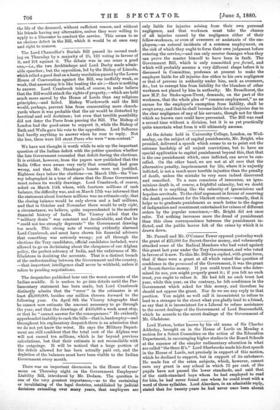We have not thought it worth while to mix up
the important question of the Indian deficit with the pettier question whether the late Government concealed that deficit during the elections. It is evident, however, from the papers now published that the India Office were aware very early that something had gone wrong, and that Mr. Stanhope's boasts were not justified. Eighteen days before the elections—on March 13th—the Vice- roy telegraphed in a tone of alarm that the Home Government must reduce its weekly drawings. Lord Cranbrook, of course, asked on March 15th where, with fourteen millions of cash balance, the difficulty was, and on March 17th was informed that the statement about fourteen millions was an estimate only, that the closing balance would be only eleven and a half millions, and that in October and November there would be only eight, a circumstance, we believe, quite unprecedented in the modern financial history of India. The Viceroy added that the "military drain" was constant and incalculable, and that he "could not too strongly deprecate" the Government drawing too much. This strong note of warning evidently alarmed Lord Cranbrook, and must have shown his financial advisers that something was seriously wrong; yet all through the elections the Tory candidates, official candidates included, were allowed to go on declaiming about the cheapness of our Afghan policy, the perfect solvency of India, and the unfairness of Mr. Gladstone in doubting the accounts. That is a distinct breach of the understanding between the Government and the country, —that important, intelligence shall never be withheld, unless it refers to pending negotiations.


































 Previous page
Previous page